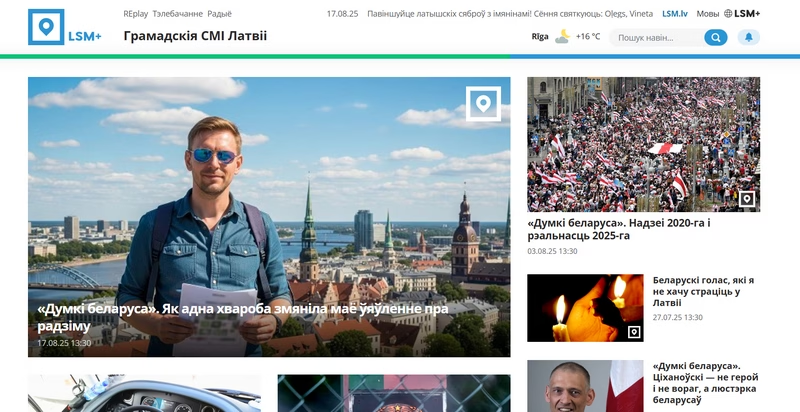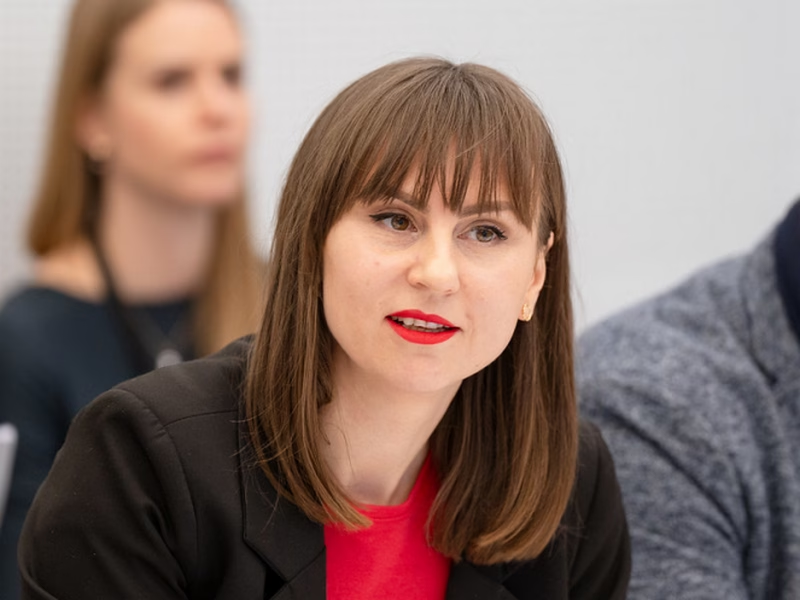Latvian parliamentarian warns against dropping Belarusian media content
The possible closure of the Belarusian division of the LSM+ Latvian media outlet has sparked widespread concern not only among the Belarusian diaspora in Latvia. BAJ looked into the issue and spoke with Latvian MP Leila Rasima, as well as with community representatives and the United Transitional Cabinet of Belarus.

Screenshot from bel.lsm.lv
Latvia’s public media (LSM — Latvijas Sabiedriskais medijs) announced its strategic development plans for 2026–2029. According to the document, starting in 2026, LSM will shift to broadcasting in four languages: Latvian, English, Ukrainian, and Russian. Belarusian and Polish (currently still available as separate language versions of the website) are not mentioned at all. Does this mean that the Belarusian-language site under LSM, just launched in July 2023, will cease to exist?
Radzivon Biahliak: Closing the Belarusian division of LSM+ could affect Latvia’s information security
The LSM decision has caused a strong public reaction, especially among the Belarusian community in Latvia, which numbers over 50,000 people. The first to sound the alarm was the Association of Belarusians in Latvia “Supolka,” created at the height of the 2020 Belarusian uprising.

Radzivon Biahliak. Courtesy photo
Radzivon Biahliak, Supolka chairman, told BAJ about the situation surrounding the Belarusian version of LSM+.
According to the strategic priorities approved by LSM management for 2026–2029, the reform aims to transition to a single digital platform. All TV and radio content will be in Latvian. At the same time, all foreign-language materials will be available exclusively in digital format on LSM.lv.
The concept specifies Latvian as the primary language on the website, with selected articles translated into Russian, Ukrainian, and English. Belarusian and Polish are not mentioned, meaning these website sections will be shut down. LSM management’s official position is that the reform is necessary to optimize costs and create a media more focused on promoting Latvian content and language.
“But in practice, if we analyze the actual work of the Belarusian division, it becomes clear that this decision could have negative consequences. Closing a popular media outlet in the native language is a severe blow to our ethnic community.
This is not just the loss of a news source — it threatens the preservation of Belarusian identity and culture. Without such a platform, the voices of the Belarusian democratic diaspora will be drowned out in the larger Russian-speaking information space,” said Biahliak.
Another crucial point often overlooked is the unique value of the Belarusian editorial team, which goes beyond informing the diaspora.
“Journalists forced to leave Belarus produce accurate and in-depth reporting for the broader Latvian audience. Although the number of direct readers of the Belarusian version of LSM+ from Latvia is limited, data show that articles created by Belarusian journalists, once translated into Latvian and Russian, receive tens of thousands of views. This proves that the newsroom is an important source of information for a wide LSM audience, not just for the Belarusian-speaking minority,” noted Biahliak.
There is also a critical aspect directly tied to Latvia’s national interests.
“What raises special concern is the impact of this decision on Latvia’s information security. Journalists forced to flee Belarus have unique expertise in covering events and countering disinformation spread by the Lukashenka regime. This is crucial, given the results of a recent survey commissioned by LSM itself: 39% of Latvians do not view the Belarusian dictatorship negatively (choosing either a positive view or ‘hard to say’). Among Russian-speakers, that figure is 83%.
In this context, closing the editorial office is seen as a step that weakens one of the few reliable information channels capable of countering propaganda and supporting Belarusians’ democratic aspirations.”
The Association of Belarusians in Latvia “Supolka” and the Ita Kozakeviča Latvian Association of National Cultural Societies appealed to members of the parliamentary group “For a democratic Belarus” in the Latvian Saeima, urging them to help preserve the Belarusian-language division of LSM+.
There is a historical precedent: during the First Latvian Republic, the well-known Latvian poet Jānis Pliekšāns (Rainis), both as a Saeima deputy and as Minister of Education, actively supported the creation of Belarusian educational institutions, recognizing that strengthening Belarusian national identity was key to breaking free from Russian influence.
Today, Latvian parliamentarians bear responsibility for continuing this historical line. They can help by raising the issue in relevant committees, such as the Saeima’s Human Rights and Public Affairs Committee, and urging the leadership of LSM and SEPLP to revise their decision.
“To discuss this issue, we are ready for dialogue and propose organizing a meeting with representatives of the Council for Public Electronic Media (SEPLP), LSM, the Saeima Human Rights and Public Affairs Committee, the parliamentary group “For a democratic Belarus,” and the Latvian MFA’s special envoy to the Belarusian democratic forces,” said Biahliak.
In addition, Supolka appealed to professional journalist associations — both Belarusian and European — to support the Belarusian division of LSM+. Support “not only as a symbol of a people still fighting for their rights, but also as a defense of the principle of cultural diversity. This is not only about media, but also about the values we must defend.”
At Supolka’s initiative, the Office of Democratic Forces of Belarus and the United Transitional Cabinet’s representatives for National Revival also came forward in support of the Belarusian section at LSM+.
Pavel Barkouski: Russian propaganda could replace the Belarusian LSM division
Pavel Barkouski, the United Transitional Cabinet’s Representative for National Revival, also commented on the issue.

Pavel Barkouski. Photo: Euroradio
“The Belarusian division of Latvia’s Public Media was established in July 2023. It was an exceptional project and a successful example of cooperation between media professionals of different nations.
The creation of an independent Belarusian-language information channel for residents of Latvia and the border regions of Belarus was not only an effective tool for countering disinformation and propaganda spread in Russian across the region, but also a reliable means of preserving and strengthening Belarusians’ national identity.
Its appearance on one of Latvia’s major public media platforms was a meaningful symbolic gesture of support for Belarusians’ struggle for democracy and independence, a source of hope that our values align with European nations ready to welcome Belarusians into their family in the future.
By contributing to the fight against disinformation and working for regional security, this media outlet also served as a barrier against further Russianization of Belarusians. Many who are forced to stay in Latvia cannot yet fully integrate into the local information space, and may mistakenly turn to biased Russian-language sources. If Belarusian voices are silenced and the Belarusian division of LSM+ cannot continue its work, it will deal a severe blow to solidarity — and mark a victory for Russian propaganda, which could then become the primary source of news for Belarusians in the region.”
Leila Rasima: “We Must Not Lose This Valuable Resource”
Leila Rasima, an MP from The Progressives Party in the Latvian Saeima, shared her perspective with BAJ on the possible closure of the Belarusian division of LSM+. After the parliament’s recess, she plans to convene a meeting of the Saeima Human Rights Committee and, together with LSM and the Council for Public Electronic Media (SEPLP), hold hearings on the issue.

Leila Rasima. Photo: flickr.com/Ieva Ābele, Saeima/CC BY-SA 2.0 DEED
What is the primary goal of the LSM reform?
“The goal is to stop the division of the information space in Latvia – between Latvian and Russian speaking audiences, and to ensure that in the future Latvian public media, both TV and radio, provide content only in the state language. Therefore, starting from 2026, it is planned to switch Latvian Radio broadcasts to only the state language by shutting down the LR4 channel. Meanwhile, LTV content is already provided exclusively in Latvian.”
LSM management plans to shut down the Belarusian-language version of the site starting in 2026. Why was this decision made?
“Alongside the decision to provide content on Latvian TV and radio only in the state language, other changes are also planned to strengthen and improve the efficiency of Latvia’s public media. This includes restructuring the editorial teams within the LSM.LV online platform.
The LSM.LV editorial team, which currently creates and publishes digital content in the Latvian language, will be joined by the LSM+ (historically rus.lsm) editorial team, which presently produces content in various minority languages, but predominantly in Russian. As a result, the LSM+ editorial team will no longer exist in its current form and will be integrated into the main LSM editorial team. Going forward, content creation will be carried out jointly within a single editorial structure.
Although the strategic priorities prepared by the LSM Board for 2026 — 2029 state that content on TV, radio, and digital platforms will primarily be in Latvian, there are no plans to abandon content in other languages completely. The strategic priorities mention three languages — English, Russian and Ukrainian. However, in response to objections from Polish and Belarusian organizations about the need to maintain content in Polish and Belarusian, the LSM Board will work to find solutions to meet the needs of these communities as well.”
The Belarusian version of LSM has become one of the loudest voices of the Belarusian diaspora in Latvia. Stories are created by Belarusian journalists who fled political repression. They fight Lukashenka’s propaganda by telling the truth about what’s happening in Belarus. Their publications are then translated into Latvian and Russian, the site’s main languages. In the context of an information war, doesn’t it make sense to strengthen the Belarusian division instead of closing it?
“I believe that content in Latvian public media about events in Belarus is highly important for the entire Latvian society, as it allows us to provide objective information and combat disinformation and propaganda coming from the Kremlin and the Lukashenko regime. This is crucial for Latvia’s security, as we know well that there is also an information war.
Also, content in the Belarusian language is essential for the local Belarusian community, who relocated to Latvia following the 2020 repressions of Lukashenka’s regime. It allows the Belarusian diaspora to access information about significant events and important political decisions in Latvia that affect their lives here.
I also believe it is a major advantage that Belarusian journalists work in Latvian public media, as they are best positioned to understand and represent what matters to the Belarusian community in Latvia, as well as to cover developments in Belarus that the entire Latvian society should be aware of.
I believe we must not lose this valuable resource, nor should we, in the name of improving efficiency or cutting costs, abandon Belarusian-language content in the digital environment. By maintaining this content, we not only effectively reach the Belarusian diaspora in Latvia but also strengthen Latvia’s security by fighting disinformation and showing solidarity with the Belarusian people in their struggle for freedom and democracy in Belarus.”
— The Belarusian diaspora appealed to MPs for help in preserving the Belarusian division of LSM+. How can parliamentarians assist?
“As the Chair of the Parliamentary cooperation group in Support of a Democratic Belarus, I support the call by Belarusian diaspora organizations in Latvia, as well as by the Democratic Forces of Belarus, to preserve content in Belarusian in Latvia’s public media.
When the Saeima resumes work in September after the summer recess, I plan to convene a meeting of the Human Rights and Public Affairs Committee to address this issue specifically. I intend to invite the LSM Board and the Public Electronic Mass Media Council (SEPLP) to present their planned solutions regarding the future work of LSM.
Our goal is to strengthen the newly united Latvian public media. In this process, it is essential not to lose what already works well and contributes significantly to its mission.”
 @bajmedia
@bajmedia
